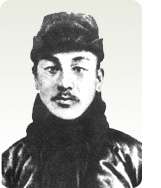Lee Hoe-yeong
| Lee Hoe-yeong | |
|---|---|
 | |
| Born |
17 March 1867 Hanseong (Present day Seoul), Joseon (Present-day South Korea) |
| Died |
17 November 1932 (aged 65) Ryojun(present-day Lüshun), Dalian, China |
| Nationality | Korean |
| Korean name | |
| Hangul | 이회영 |
| Hanja | 李會榮 |
| Revised Romanization | Lee Hoe-yeong |
| McCune–Reischauer | Yi Hoe-yŏng |
| Pen name | |
| Hangul | 우당 |
| Hanja | 友堂 |
| Revised Romanization | Woodang |
| McCune–Reischauer | Udang |
Lee Hoe-Yeong or Lee Hoe-Young (Hangul: 이회영; Hanja: 李會榮), also known by his pen name Woodang (Hangul: 우당; Hanja: 友堂), (March 17, 1867 – November 17, 1932) was a Korean independence activist, anarchist and one of the founders of Shinheung Military Academy (Hangul: 신흥 무관 학교) in Manchuria. He used his entire fortune worth about two trillion won (1.7 billion dollars) in today's value to fight against the Japanese occupation of Korea. He is the elder brother of Lee Si-Yeong, future Vice President of the Republic of Korea.
Born in a renowned noble family in which his ancestors were appointed governmental officials during the Joseon Dynasty, he and his brothers (with the exception of his eldest brother) decided to flee Korea, rather than to become subjects of oppression. His siblings are:
- Lee Gun-yeong (이건영,李健榮) (1853–1940)– First and eldest brother
- Lee Seok-yeong (이석영,李石榮) (1855–1934)– Second brother, died of starvation in Shanghai, China
- Lee Cheol-yeong (이철영,李哲榮) (1863–1925)– Third brother
- Lee Si-yeong (이시영,李始榮) (1868–1953)– Fifth brother
- Lee Ho-yeong (이호영,李護榮) (?-1933)– Sixth and youngest brother. He and his entire family went missing in 1933, never to be heard of again.
When Lee arrived in China, he stayed in Manchuria before moving to Beijing and later Shanghai.
Lee was arrested upon arrival from Shanghai at Dalian, and later imprisoned in the infamous Lushun Prison until his death. He died on November 17, 1932. The cause of his death was a mystery, and the Japanese authority claims that he had hanged himself on the window bars of a police station, using a hemp cloth. The Japanese' claim was refuted by Koreans, who claimed Lee was killed by the Japanese. Upon his death, his remains was cremated on the same day; his ashes was later brought back to Japanese-occupied Korea. His remains were last re-interred at Seoul National Cemetery, years after Korean independence.
Lee was posthumously awarded with the Order of Merit for National Foundation in 1962. In 2000, the Chinese government proclaimed him as a "Patriotic martyr of the anti-imperialism/anti-Japanese revolution" for his struggle against Japanese imperialism in China.
In 2010, a five-part drama series was aired by KBS to commemorate of his struggle, titled Freedom Fighter, Lee Hoe Young(자유인 이회영).[1][2] The series aired on 29 August 2010, the date of the centenary of the Annexation of Korea by Japan.
References
| Wikimedia Commons has media related to Lee Hoe-yeong. |
External links
- Woodang Memorial Hall (Korean)